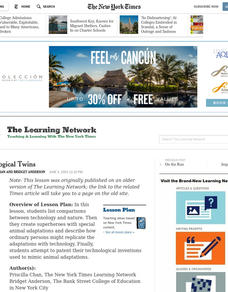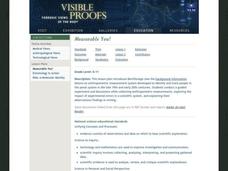Chymist
Batteries
Young scientists study the construction of a battery through experimentation. They engage in five experiments which combine to create a thorough study of the history of batteries beginning with a model of the first battery.
Curated OER
Technological Twins
Learners list comparisons between technology and nature. Then they create superheroes with special animal characteristics and describe how ordinary persons might replicate the changes with technology.
Urbana School District
Magnetism
The compass was first used in 206 B.C., but we didn't discover magnetic poles until 1263 A.D. Presentation begins with the history of magnetism before continuing on to magnetic fields, magnetic forces, electromagnets, currents,...
National Energy Education Development Project
Exploring Transportation
Did you know horsepower is actually based on the power of a horse? 60 horse power is the equivalent of being pulled by a team of 60 horses! Viewers will learn other interesting facts like this from a presentation that begins with the...
NOAA
Make Your Own Compass
Scholars build a compass using a needle, cork, magnet, and a water-filled cup in order to locate the magnetic north and south.
PBS
Pop Fly
A lever comes in handy when scholars build a launcher for a ping-pong ball. They test the launcher and redesign it to send the ball higher or to accommodate a tennis ball. This is the third lesson in a five-part unit.
American Museum of Natural History
Talking to Fireflies
Fireflies are more than just mobile twinkle lights. An online interactive lesson teaches individuals about the light patterns fireflies use to communicate with each other. After they practice the patterns themselves, they could be...
University of Colorado
Astro-Chronology
Class members play a version of the game Chronology to determine when certain scientific events occurred in history. Teams play until someone has 5-10 events in the correct order.
Polar Trec
Down to the Deep Virtual Lab
At a depth of 3,000 m in the ocean, the pressure is 300 times that at sea level! In the activity, individuals predict what will happen to Styrofoam cups submerged 3,000 meters into the ocean. They then convert these units to soccer...
Curated OER
Measurable You!
Conduct guided experiments and discussions while collecting anthropometric measurements. Your class will explore impact of experimental errors in a scientific system, and explain their observations/findings in writing. An introduction to...
Curated OER
What's The World Made Of?
Second graders identify the three states of matter by examining fishbowls with various contents. They discuss their observations and the characteristics of matter in each state. Pupils read the story The Rainbow Fish and look for...
Curated OER
What do you know about earthquakes??
Ninth graders compare and contrast various writing styles and distinguish technical writing from other writing techniques. They assess personal knowledge regarding earthquakes and earthquake preparedness.
NOAA
Ocean Exploration
Sea explorers and scientists have found that because of temperatures being two to three degrees Celsius at the bottom of the ocean, most animals are lethargic in order to conserve energy. In this web quest, pairs of learners read about...
Curated OER
Research Ethics
Young scientists discuss the results of carelessness during experimentation and the temptation to misrepresent findings. These activities are intended to develop the ability to identify scientific error, misconduct, and fraud. Use this...
Curated OER
What a Hard Test!
Fifth graders complete an exercise that introduces them to Moh's scale of mineral hardness. The scale is presented on the activity, and learners answer three questions which have them assign a hardness rating based on some clues. For any...
Chicago Botanic Garden
Accessing Prior Knowledge: Global Climate Change Survey
Begin a unit on weather and climate change by assessing prior knowledge of the topic. Learners respond to a survey with questions that ask what they think causes climate change, the effects of climate change, and if it is important to...
Chicago Botanic Garden
Reflecting on What I Learned About Climate Change
After three eye-opening lessons about our environment, scholars revisit a 10-question survey, reflect on their new-found knowledge, and take action by writing to a representative or creating a public service announcement about climate...
NOAA
Individual Species in the Deep Sea
A tube worm's outer covering is made of chitin, the same material that makes up the shells of lobsters and crabs. Scholars create tube worms and analyze and discuss the longevity of organisms living near cold seeps. They then discuss and...
Rube Goldberg
Rube Goldberg Machines
Use humor to study simple machines! An engaging set of nine lessons allows learners to explore simple machines, kinetic, and potential energy as they work through cartoon renditions inspired by Rube Goldberg. Choose one or multiple...
Cornell University
Alka-Seltzer Rockets
Blast off! An engaging hands-on activity has pupils create rockets powered by Alka-Seltzer. They learn about the physics behind these rockets throughout the process.
NASA
Catch a Piece of the Sun
What does the sun mean to you? Learners have many different interests that may have connections to the sun. Whether its solar radiation, solar flares, or solar storms, there are connections to daily interests that may surprise your...
Curated OER
Animal and Plant Cell Journaling Activity
Jump into the classification of animal and plants cells, through this inviting lesson comparing Elodea leaves and Epithelial cells. Middle school learners will create wet mounts, write journal entries that compare specimens, and finally...
Curated OER
Designer Colors, an Inquiry Approach to Flame Testing
Students investigate the spectroscopic colors unique to elements, and to use this information to create a specific color. They follow a detailed schematic to produce a spectroscpoe to be used in the testing.
Curated OER
Folds in the Earth
Ninth graders demonstrate the forces that cause folds in the earths crust by use of clay modeling. They demonstrate there knowledge of terminology and concepts related to Earths folding processes by a written or oral report on data...
Other popular searches
- Science Inventions 6th Grade
- Science Inventions 1st Grade
- Ancient Science Inventions
- Science Inventions 6th
- Incidence Science Inventions
- Physical Science Inventions
- Science Inventions Eliticity
- Ancience Science Inventions
- Science Inventions Eletisty
- Science Inventions Elitist
- Science Inventions Elasticity

























